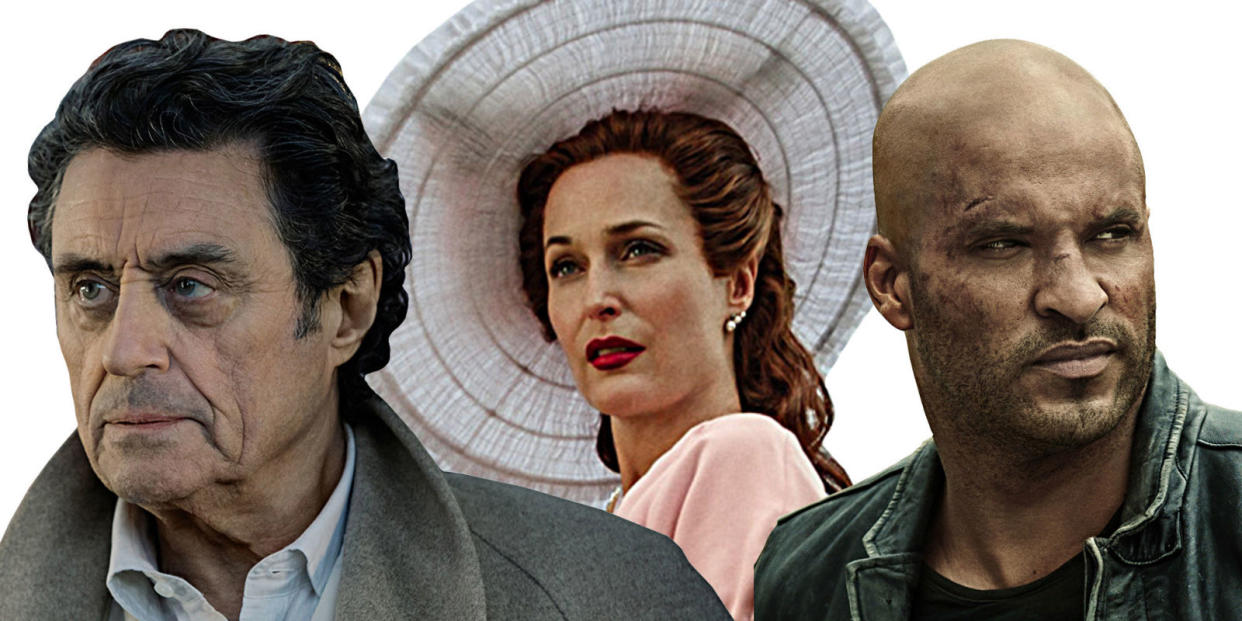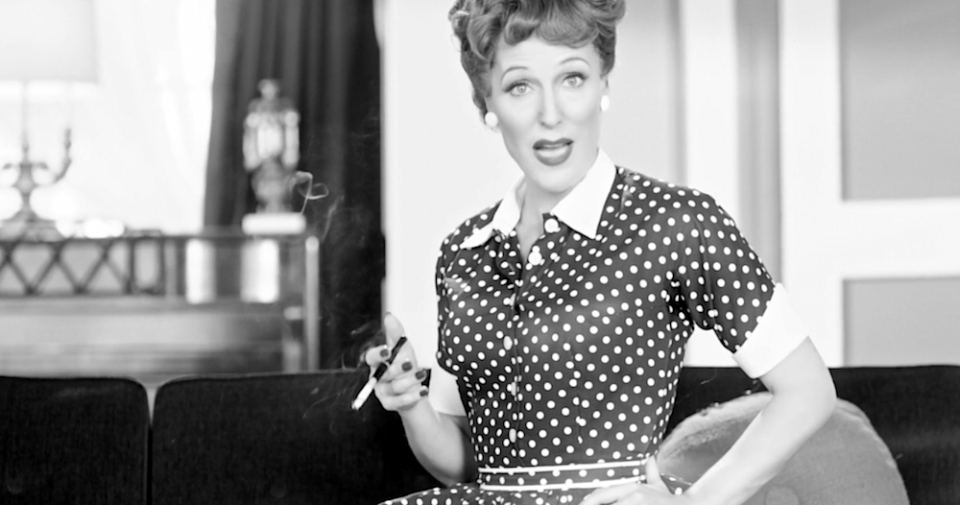'American Gods' Is Doing Exactly What Neil Gaiman's Book Couldn't

There's an interaction in Neil Gaiman's 2001 novel American Gods in which its hero, Shadow Moon, converses with the new god of Media. This personification of communication has taken the form of Lucille Ball from I Love Lucy, and she talks to him from a TV screen. She begins:
"I'm the idiot box. I'm the TV. I'm the all-seeing eye and the world of the cathode ray. I'm the boob tube. I'm the little shrine the family gathers to adore."
"You're the television? Or someone in the television?"
"The TV's the altar. I'm what people are sacrificing to."
"What do they sacrifice?" asked Shadow.
"Their time, mostly," said Lucy. "Sometimes each other."
The premise of Gaiman's novel is that when outsiders first came to America, they brought with them the ancient stories, characters, and deities from throughout global human history. These gods entered the melting pot of American society and soon, as Gaiman puts it in the book, are replaced by new gods "of credit card and freeway, of Internet and telephone, of radio and hospital and television, gods of plastic and of beeper and of neon. Proud gods, fat and foolish creatures, puffed up with their own newness and importance."
These new gods are the likes of Media and Technology who are replacing the ancient Norse, Biblical, and West African gods. At its core, American Gods is a road trip story through the U.S. heartland. Its hero, Shadow Moon, is an ex-convict who finds himself in the employment of the mysterious Mr. Wednesday. He soon learns that Wednesday is the Norse god Odin, who is in a hidden war between his faction of old gods and the new gods.

But these themes, along with the idea of immigration and the homogenization of U.S. culture, have vastly different implications in 2017, when American Gods is making its way to the television screen (or computer or tablet) where Shadow first meets Media. One would imagine that 16 years after Gaiman published his book, in a world where social media and streaming services occupy our time more than TV ever could alone, the old gods have lost. And that, alone, makes American Gods-even for those who have read the book-such a fascinating new series. On TV, more than a decade later, it can explore more of these themes from a modern lens.
Plot-wise, the TV version, which debuted on Starz on Sunday, stays true to the original source material. It's a sprawling synthesis of human storytelling in the form of American folklore. When translated to television, it's a lush, colorful, and expensive adaptation-a telling of the same story that fits the medium. Most importantly, it fits the time as well thanks to cosmetic updates that thankfully came from Gaiman himself, who worked with the show as executive producer.
One noticeable change is to Technical Boy (the god of technology), who in the book was a fat cyber-punk, Matrix type. As Gaiman explained to Gizmodo:
"Now, he's vaping and it's that kind of thing where these days the Technical Boys are that unpleasant gentleman from Uber filmed getting out of his Uber with his two women explaining to the guy who went bankrupt trying to Uber that it was his own fault for not being a hard enough worker. Or you know Mark Zuckerberg going straight over into explaining why it's not his fault that they put up fake news or that Facebook live thing of the guy getting murdered. It's 'hey gee whiz, isn't augmented reality going to be fantastic?' These are our technical boys now. And they're still saying the same stuff they just look a bit prettier on the outside and they have a bigger limo."
He's now a character who would be accurate enough for HBO's Silicon Valley. And this is an instrumental change to reflect the growing perception of technology in today's culture. American Gods was written just after the dot com boom and bust, when tech guys were perceived as these washed up nerds. It also speaks to the growing power of technology-it's cool now, which could possibly make it infinitely more dangerous. These cosmetic changes come in the form of the casting, too, in which iconic television star Gillian Anderson typifies the idea of the all-powerful Media. Ian McShane, who has played memorable fantasy and Western roles on Game of Thrones and Deadwood, respectively, appears as Mr. Wednesday, one of the central characters of this genre-bending story.
Another theme which speaks louder in the TV adaptation given our modern times is that of immigration. Like The Handmaid's Tale, which coincidentally arrived just after the election of a president who marginalizes women, American Gods is here during a time of extreme American xenophobia. American Gods is, in many ways, a glorification of the many cultures that make up this country. It champions otherness in a way that's desperately needed in this country today. As Gaiman recently told Vice:
"The thing that baffles me mostly now is, stuff that I wrote 17 years ago that I did not think was in the slightest bit contentious suddenly is. Like the idea that immigration is a good thing. That people have been coming to America from all over the world for years and years, voluntarily and involuntarily, and bringing wonderful things with them, and making this country richer-I didn't think that was open to debate. I didn't think it was in any way contentious having characters from all different beliefs and cultures and skin tones, because that makes America. I didn't think it would be contentious having a mixed-race lead, because that is America."
There will be no shortage of time for Gaiman to expand and update these ideas for modern times. This first season will get through about one-third of the book, which means we can expect at least three seasons. And the yet-unwritten sequel to American Gods, which could be the source material for subsequent seasons, has long been in the works. He's even mentioned the show could be used as a conduit for other "Coming to America" stories that highlight how gods arrived in this country.
Last night's episode began with one of the most stunning scenes of the series. It introduces Mr. Nancy, a representation of the West African god Anansi played by Orlando Jones. In the book he's introduced during a meeting held by Mr. Wednesday. But in the show, he appears in one of these "Coming to America" sequences. He's dressed in modern clothing speaking to a ship full of shackled slaves sailing toward America. He tells them about the horrors and challenges that await them in the New World for centuries to come. It's a stunning scene, fueled undoubtedly by the social unrest in this country.
American Gods the book will remain one of the classic works of contemporary American fantasy. But American Gods the TV show is precisely the adaptation of this work that we deserve in 2017. Perhaps it's ironic-or perhaps it's more representative of the struggle between old and new gods-that the American Gods series has power that not even Neil Gaiman ever imagined. Consider Shadow's interaction with Media-on last night's episode, Lucille adds, "Now they hold a smaller screen in their lap or in the palm of their hand so they don't get bored watching the big one."
You Might Also Like


